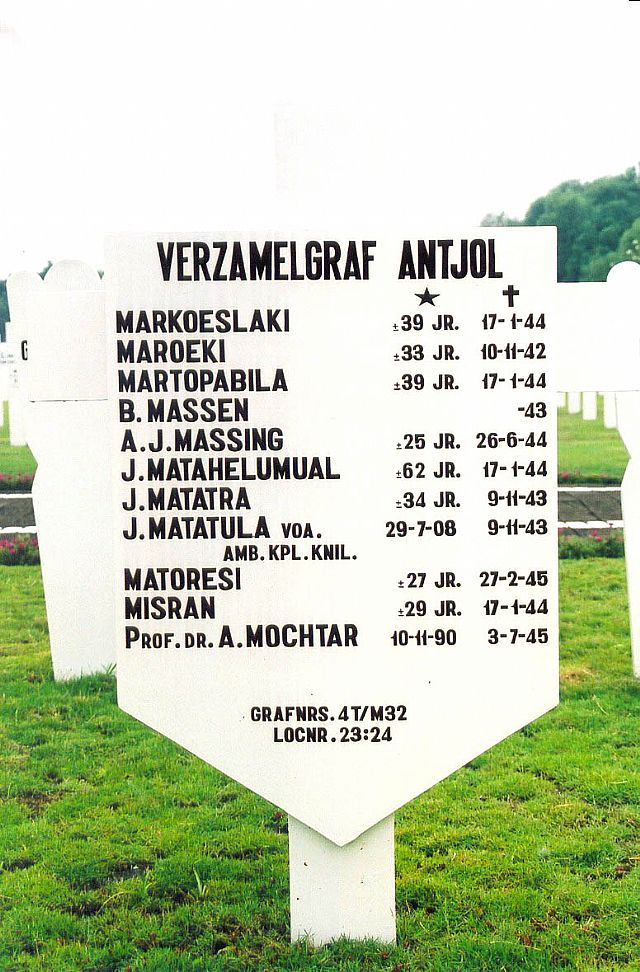Achmad Mochtar
1890-1945
Oorlogsslachtoffer
Is 54 jaar geworden
Geboren op 10-11-1890 in Bondjol
Overleden op 03-07-1945 in Batavia-Antjol
Bijdragen
De volgende bijdragen zijn door bezoekers toegevoegd:
Artikel over Achmad op website The Guardian
Achmad Mochtar died to save his wartime colleagues, academic discoversIndonesian scientist beheaded by Japanese in 1945 to cover up a tetanus vaccine poisoning, finds Kevin Baird of Oxford University Clinical Research Unit
Robin McKieA British...
Lees meer
Achmad Mochtar died to save his wartime colleagues, academic discoversIndonesian scientist beheaded by Japanese in 1945 to cover up a tetanus vaccine poisoning, finds Kevin Baird of Oxford University Clinical Research Unit
Robin McKieA British academic has helped to uncover the truth behind the execution of one of Indonesia's greatest scientists by the country's Japanese occupiers. Achmad Mochtar was not only a martyr for his country and profession, Kevin Baird has discovered, he was a hero who sacrificed himself so that the rest of his staff could live.Baird – director of the Oxford University Clinical Research Unit in Jakarta – has spent months investigating Mochtar's beheading by Japanese troops in 1945. At the time he led Jakarta's Eijkman Institute of medical research, which was accused of poisoning hundreds of Indonesian forced labourers working for the Japanese.In fact, the deaths were the result of a medical experiment carried out by Japanese military authorities that went wrong, Baird has discovered. The workers were given a trial tetanus vaccine, made by Japanese doctors, before it was given to Japanese soldiers and airmen. The vaccine failed, however, and an estimated 900 workers died.To cover up, Japan blamed Mochtar and the staff of the Eijkman – which had been involved in parallel vaccine work – and arrested them in October 1944. They were beaten, burned and electrocuted. One of them died.Then the Japanese abruptly released the institute staff – except Mochtar, who was later beheaded and his body crushed by a steamroller before his remains were buried in a communal grave. Baird has discovered that Mochtar had agreed to take the blame for the poisonings if his colleagues were released."Achmad Mochtar was not only a hero of Indonesia, but a hero of science and humanity," Baird told the Observer. "He had everything to lose, including a wife at home. Yet he laid down his life for his staff, colleagues and friends."This view is backed by Indonesian scientists who have been investigating Mochtar's killing with Baird. "He died a martyr, protecting his subordinates," said Sjamshidajat Ronokusumo, of the Indonesian Academy of Sciences.It has taken 65 years to uncover the truth about Mochtar's death. Baird heard about the story of his execution from a student. With the biologist Sangkot Marzuki, Baird then began interviewing the families of survivors."We think of this sort of heroism as the reserve of military men and not learned intellectuals," said Baird. "However, that is not the case, as we can see from the story of Achmad Mochtar.
Sluiten
Bron: https://www.theguardian.com/world/2010/jul/25/achmad-mochtar-scientist-heroic-sacrifice
Geplaatst door M. Rodenburg op 21 februari 2020
Voeg zelf een monument toe
Log in om een monument toe te voegenVoeg zelf een bijdrage toe
Log in om een bijdrage toe te voegenCategorieën
Leg bloemen op dit graf
Wilt u graag bloemen laten leggen op dit graf, dan verzorgen wij dit graag voor u.
Bestel bloemen

